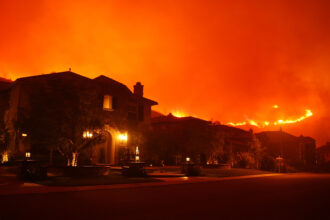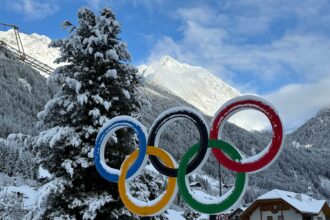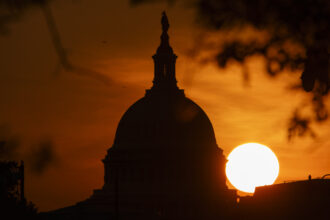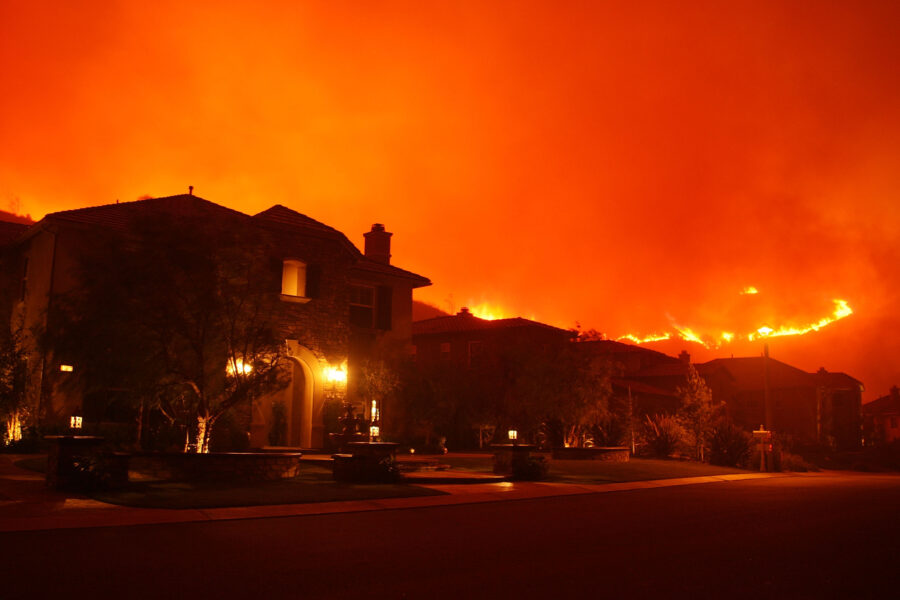As the harsh reality set in Thursday that President Vladimir Putin was, in fact, invading Ukraine, starting the largest conflict in Europe since World War II, many analysts speculated what a major war could mean for a continent that has long depended on exported fossil fuels from Russia.
One casualty, analysts surmised, would be global efforts to tackle climate change. Dealing with the immediate consequences of war could prompt countries to set aside their efforts to deal with the broader climate crisis. A prolonged war could lead to a growing number of nations cutting ties with Russia, along with its significant supply of oil and gas to the world, spurring other countries to boost their own production and increase emissions. Already, the world market is feeling the crunch, with oil prices soaring above $100 per barrel for the first time since 2014.
But there is also evidence that Russia’s foray could be inadvertently accelerating the transition to cleaner energy. As stocks plummeted on Thursday in reaction to Russia’s invasion, the European Renewable Energy Index surged as much as 9.3 percent. It was the biggest stock jump since the pandemic lows of March 2020 and posed a stark contrast to the European market’s collapse.
In the United States, individual renewable energy companies also saw massive gains. When the market closed Thursday, the stock price for Sunrun Inc., an American company that provides residential solar panels and batteries, had skyrocketed nearly 22 percent. Conversely, stocks for oil majors like BP, Chevron and ExxonMobil all remain down after a major price drop on Wednesday.
“When there’s less certainty about other sources of energy, that will help renewables because they’re a cheap source of electricity,” Joe Keefe, CEO of Pax World Funds, a line of fossil-fuel-free funds, told the financial services firm Morningstar. “They’ve become very competitive from a price standpoint and are good long-term investments.”
Some developing countries have also expressed that they see the Russia-Ukraine conflict as an opportunity to attract new global investments around clean energy, a move that could help provide long-term energy security, while at the same time helping nations meet their climate goals.
“I see an opportunity here as the economics for investing in renewable energy here in the Philippines might even be accelerated,” Ceferino Rodolfo, the country’s top trade official, said regarding the Russian conflict at a virtual meeting hosted by energy developers on Wednesday.
Like most island nations, the Philippines depends heavily on imported fossil fuels and could benefit significantly from installing more wind, solar and hydroelectric power—something the nation has been pushing for as it aims to phase out its coal-fired power plants.
Still, it’s unclear just how the Eastern European conflict will play out and whether it will ultimately advance or hinder the world’s climate efforts. Besides its horrific toll on human life, war is also an incredibly carbon-heavy endeavor. A drawn out conflict involving a world superpower could mean a major bump in greenhouse gas emissions in the coming months or years.
The U.S. military, for example, released a massive amount of climate-warming emissions during its 20-year armed conflict in the Middle East. Since the beginning of the Global War on Terror in 2001, the military has produced more than 1.2 billion metric tons of greenhouse gases, according to one recent analysis. That exceeds what entire countries like Portugal and Denmark emitted during that same period.
Russia’s army undoubtedly has its own massive carbon footprint. As of last year, Russia’s army ranked second largest in the world, behind the U.S., when considering overall budget, enlisted troops and military vehicles combined. Among its arsenal are 15,398 tanks, 3,429 aircraft and 55 submarines, which produce a lot of greenhouse gas emissions.
That’s it this week for Today’s Climate. Thanks for reading and I’ll be back in your inbox on Tuesday.
Today’s Indicator
750,000 square miles
As of Tuesday, that’s the span of ice covering the Antarctic coast, marking the lowest amount of sea ice surrounding the continent in four decades, u003ca href=u0022https://www.nytimes.com/2022/02/23/climate/antarctica-sea-ice-arctic.htmlu0022u003eresearchers saidu003c/au003e.
Top News from Our Warming World
Biden Halts Oil and Gas Leases Amid a Legal Fight on Climate Cost – Associated Press
Federal Government Denies California Farmers Water Access, Citing Drought – Associated Press
Climate Denial Still Flourishes on Facebook, New Report Says – E&E News
About This Story
Perhaps you noticed: This story, like all the news we publish, is free to read. That’s because Inside Climate News is a 501c3 nonprofit organization. We do not charge a subscription fee, lock our news behind a paywall, or clutter our website with ads. We make our news on climate and the environment freely available to you and anyone who wants it.
That’s not all. We also share our news for free with scores of other media organizations around the country. Many of them can’t afford to do environmental journalism of their own. We’ve built bureaus from coast to coast to report local stories, collaborate with local newsrooms and co-publish articles so that this vital work is shared as widely as possible.
Two of us launched ICN in 2007. Six years later we earned a Pulitzer Prize for National Reporting, and now we run the oldest and largest dedicated climate newsroom in the nation. We tell the story in all its complexity. We hold polluters accountable. We expose environmental injustice. We debunk misinformation. We scrutinize solutions and inspire action.
Donations from readers like you fund every aspect of what we do. If you don’t already, will you support our ongoing work, our reporting on the biggest crisis facing our planet, and help us reach even more readers in more places?
Please take a moment to make a tax-deductible donation. Every one of them makes a difference.
Thank you,












